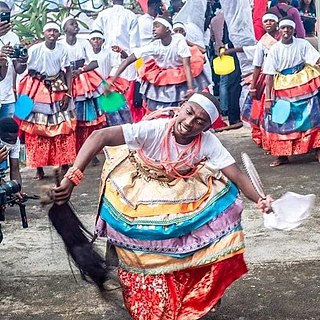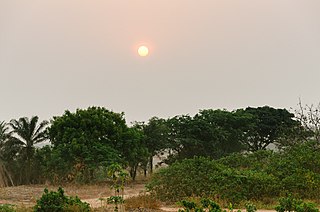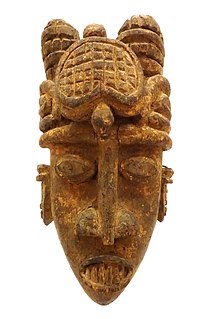Related Research Articles

Ijaw people are a mixture of people majorly a tribe in Bayelsa in South South region in Niger Delta in Nigeria, Predominantly found in Bayelsa state, Delta State and Rivers State.They are also found in other Nigerian states like Ondo, Edo and Akwa Ibom. Many are found as migrant fishermen in camps as far west as Sierra Leone and as far east as Gabon. Population figures for the Ijaws are placed at just over 6 million, accounting for 1.8 % of the Nigerian population. They have long lived in locations near many sea trade routes, and they were well connected to other areas by trade as early as the 15th century.

The Niger Delta is the delta of the Niger River sitting directly on the Gulf of Guinea on the Atlantic Ocean in Nigeria. It is typically considered to be located within nine coastal southern Nigerian states, which include: all six states from the South South geopolitical zone, one state (Ondo) from South West geopolitical zone and two states from South East geopolitical zone. Of all the states that the region covers, only Cross River State is not an oil-producing state.
Defaka is an endangered and divergent Nigerian language of uncertain classification. It is spoken in the Opobo–Nkoro LGA of Rivers State, in the Defaka or Afakani ward of Nkọrọ town and Ịwọma Nkọrọ. The low number of Defaka speakers, coupled with the fact that other languages dominate the region where Defaka is spoken, edges the language near extinction on a year-to-year basis. It is generally classified in an Ijoid branch of the Niger–Congo family. However, the Ijoid proposal is problematic. Blench (2012) notes that "Defaka has numerous external cognates and might be an isolate or independent branch of Niger–Congo which has come under Ịjọ influence."

The Ogonis are a people in the Rivers South East senatorial district of Rivers State, in the Niger Delta region of southern Nigeria. They number just over 2 million and live in a 1,050-square-kilometre (404-square-mile) homeland which they also refer to as Ogoniland. They share common oil-related environmental problems with the Ijaw people of the Niger Delta.
Ijoid is a proposed but undemonstrated group of languages linking the Ijaw languages (Ịjọ) with the endangered Defaka language. The similarities, however, may be due to Ijaw influence on Defaka.

The Itsekiri are one of the Yoruboid subgroup of Nigeria's Niger Delta area, Delta State. The Itsekiris presently number 2.7 million people and live mainly in the Warri South, Warri North and Warri South West local government districts of Delta State on the Atlantic coast of Nigeria. Significant communities of Itsekiris can be found in parts of Edo and Ondo states and in various other Nigerian cities including Lagos, Sapele, Benin City, Port Harcourt and Abuja. Many people of Itsekiri descent also reside in the United Kingdom, the United States and Canada.The Itsekiris are closely related to the Yoruba of South Western Nigeria and more widely to the Urhobo and Edo peoples.
The Eleme people are one of the various groups of indigenous peoples that inhabit the Niger Delta region of South-South Nigeria.

Igboland, also known as Southeastern Nigeria, is the indigenous homeland of the Igbo people. It is a cultural and common linguistic region in southern Nigeria. Geographically, it is divided by the lower Niger River into two sections: an eastern and a western one. Its population is characterised by the diverse Igbo culture and the speakers of equally diverse Igbo languages.

There are over 525 native languages spoken in Nigeria. The official language of Nigeria is English, the language of former colonial British Nigeria. As reported in 2003, Nigerian English and Nigerian Pidgin were spoken as a second language by 100 million people in Nigeria. Communication in the English language is much more popular in the country's urban communities than it is in the rural areas, due to globalization.
The Ijawlanguages, also spelt Ịjọ, are the languages spoken by the Ijo people in southern Nigeria. Toke-ere is an ijaw name which means flawless woman, guiltless woman and in some parts translated as neat woman

The Kalabari are a sub-group of the Ijaw people living in the eastern Niger Delta region of Nigeria. Originally, they were known as the Awome. The name Kalabari was derived from their ancestor Perebo Kalabari who was a son of Mein Owei. Their original settlement was spelt as Calabar by the Portuguese which was pronounced Kalabari. This settlement (town) was abandoned as the people moved to other fishing settlements. Portuguese settlers continued to maintain the name Calabari which became surrounded by the Efik people of Duke town. When the British came the word Calabari was pronounced as Calabar (Kalaba) instead of Kalabari. At this time the original Ijoid Kalabaris had moved to a new location which became the new Calabar territory since the old Calabar is occupied by different people. Old Calabar became an Efik town with time which has the name Calabar.
The Nkoroo people are an Ijaw people living in Nkoroo, Rivers State, Nigeria, numbering about 4,700 (1989). The Nkoroo live in a close relationship with the Defaka, with both groups living in the same town. They speak their own language, called Nkoroo. The Nkoroo people refer to themselves and their language as 'Kirika', though 'Nkoroo' is the standard name used by outsiders and in the scholarly literature.
The Obolo People, also known as Andoni tribe, is part of the proposed Obolo State. Obolo people are found in Rivers State, Akwa Ibom State and Abia State. They have historical relations with Oron people, Ohafia, Ogoloma, Ido and Ibeno people of Niger Delta in Nigeria.
The Engenni people live in the Niger Delta region of Nigeria. They are considered to be Edoid based on linguistic grounds. They live in close proximity with their Ijaw relatives. They primarily live in Ahoada west local government area of Rivers state, Nigeria. Although they consider themselves to be Engenni, the Engenni speak an Edoid language. Alagoa (2003) said: “---The penetration of the Niger-Delta by Edoid groups extends to the Epie-Atissa and Engenni of the central and Eastern Niger-Delta----The Epie, along with the Ogbia and other groups of the central and eastern Niger-Delta, are historically united with the Ijaw.” The other groups of the central and eastern Niger-Delta which Professor Ebiegberi Alagoa said that were historically united with the Ijaw, include the Engenni, as shown from his narrative above. The Engenni have close relations with neighbouring Ijaw tribes such as the Zarama and Epie-Atissa.
The Itsekiri language is a major branch of the Yoruboid group of languages, which as a group, is a key member of the Volta–Niger sub-family of the Niger–Congo family of African languages. Itsekiri is spoken by nearly 900,000 people in Nigeria as a first language and by many others as an additional language notably in the Niger Delta and in parts of Edo and Ondo states of Nigeria. The other key members of the Yoruboid group are Yoruba and Igala along with the various Yoruba dialects spoken in Benin and Togo.
Kalabari is an Ijo language of Nigeria spoken in Rivers State and Bayelsa State. Its three dialects are mutually intelligible. The Kalabari dialect is one of the best-documented varieties of Ijo, and as such is frequently used as the prime example of Ijo in linguistic literature.
Izon (Ịzọn), also known as (Central–Western) Ijo, Ijaw, Izo and Uzo, is the dominant Ijaw language, spoken by a majority of the Ijaw people of Nigeria.

Asarama is a riverine city in Andoni, Rivers State, Nigeria. It borders Bori to the north, Nkoro to the east, Ngo to the south, and Bonny and the Kalabari Kingdom to the west.
Harold Jenewari Dappa-Biriye was a Nigerian politician who was a former chairman of the Niger Delta Congress and was known for his advocacy of minority rights in Nigeria. He was also a former chairman of the Nigeria National Council of Arts and Council and it was during his tenure, the first festival (NAFEST) was held. An arts patron, he promoted events such as Bonny war canoe regattas.
References
- Blench, Roger (2000, rev. 2003) 'Language Death in West Africa' (unpublished paper given at the Round Table on Language Endangerment, Bad Godesborg, February 12–17, 2000).
- Jenewari, Charles E.W. (1983) 'Defaka, Ijo's Closest Linguistic Relative', in Dihoff, Ivan R. (ed.) Current Approaches to African Linguistics Vol 1, 85–111.
- Shryock, A., Ladefoged, P., & Williamson, K. (1996/97) 'The phonetic structures of Defaka', Journal of West African Languages, 26, 2, 3–27.